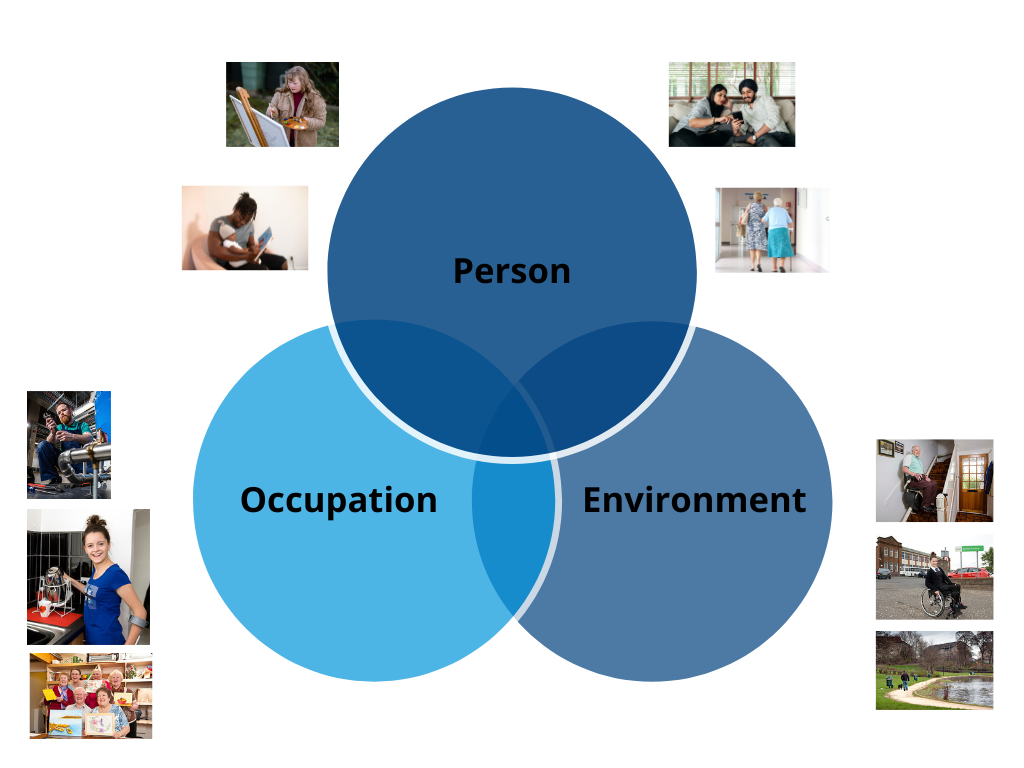What is Occupational Therapy?
“Occupational therapy helps you live your best life at home, at work – and everywhere else. It’s about being able to do the things you want and have to do.” Royal College of Occupational Therapists, (2023).
Occupations are all the activities of daily living that you need, have and want to do. Everything from getting washed and dressed in the morning, to going to work or school, to hobbies and leisure activities.
What do occupational therapists do?
Occupational therapists work with anybody who is having difficulty doing their occupations. Occupational therapists support people to recover and overcome barriers which are stopping them from doing what matters to them. We aim to empower you to actively participate in meaningful occupations to improve your mental and physical health and wellbeing.
How can occupational therapists help?
Occupational therapists consider the person, the occupation and the environment. We look beyond diagnosis and limitations and focus on what matters to you. We look at the occupation and the environment to support you to make changes to help you to participate more. Therapeutic interventions will focus on daily activities that matter to you. We might also help you to adapt your home, school and work environments. We may provide aids/equipment if/when it is needed.

Who do occupational therapists work with?
We all engage in occupations from the day we are born and then continue to do so throughout our life span. Therefore, occupational therapists work with children and adults of all ages with a wide range of conditions and differences. You can find out more about the different occupational therapy teams including how to contact them below:
Acute Adult Services
Occupational therapists work across the hospital sites and in different specialities. The best way to contact your occupational therapist is by contacting the ward or department. You can find ward contact information on the Main Hospitals page.
Children and Young People
Occupational therapists working with children and young people work in three teams:
- Child and Adolescent Mental Health Services
- Specialist Community Paediatric Teams
- Royal Hospital for Children.
You can find out more about children and young people’s occupational therapy and how to contact them on KIDS.
Learning Disability
Occupational therapists work within both community and in-patient Learning Disability Services. They are based in sites across NHSGGC.
In-patient Learning Disabilities
- Blythswood House
- Fulbar Lane, Renfrew , PA4 8NT
- Tel: 0141 314 9201
- Claythorn House Ward
- Gartnavel Royal Hospital, 1055 Great Western Road, Glasgow, G12 0YH
- Tel: 0141 211 3688
Community Learning Disability Teams
- East Dunbartonshire Joint Learning Disability Team
- East Renfrewshire Learning Disabilities Team
- Glasgow City Learning Disabilities Teams
- Inverclyde Community Learning Disabilities Team
- Renfrewshire Learning Disabilities Teams
- West Dunbartonshire Community Learning Disabilities Team
- Clydebank Centre for Health and Care, Queen Quay, Main Avenue, Clydebank, G81 1BS
- Tel: 0141 232 2190
Mental Health
Occupational therapists work in Mental Health Services and specialities across NHSGGC. The best way to contact your occupational therapist is by using the information on the Mental Health Hospitals, Resource Centres and Primary Care Teams page.
Rehabilitation
Occupational therapists work as part of multidisciplinary Rehabilitation Teams based in each Health and Social Care Partnerships across NHSGGC. Please choose you local authority and look for occupational therapy or rehabilitation teams on their websites.
Social Work
Social Work Occupational Therapy
Share your feedback
NHS Greater Glasgow and Clyde is committed to providing high quality care and treatment to our patients, and excellent service to others who use its services. Your feedback helps us build on what works well and improve what could be better.
Feedback
We encourage sharing feedback with staff delivering care, but offer various other ways for you to tell your story. It’s important to us that you can share your feedback about NHSGGC at a time and place you feel comfortable. You can find out more on our Share your feedback page.
Complaints
We understand, that sometimes things go wrong. If something goes wrong or if you are dissatisfied with something we have done, or have not done, please tell us and we will do our best to put things right. If we cannot resolve matters in the way you want, we will explain why it is not possible to do as you suggest. Find out more about our Complaints procedure or for further advice on how to make a complaint, please contact us via:
Phone: 0141 201 4500
E-mail: Complaints@ggc.scot.nhs.uk
How to become an occupational therapist
If you are interested in a career in occupational therapy you can find out more on the NHS Scotland Careers and ChooseOT websites.
